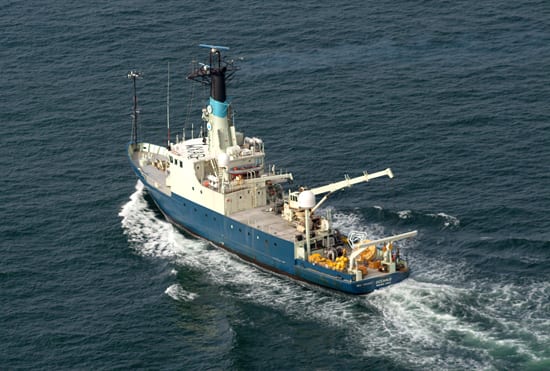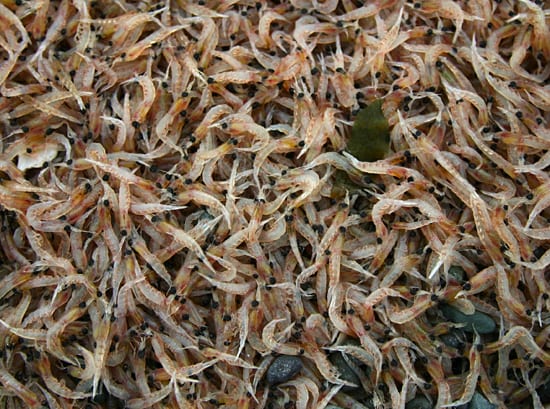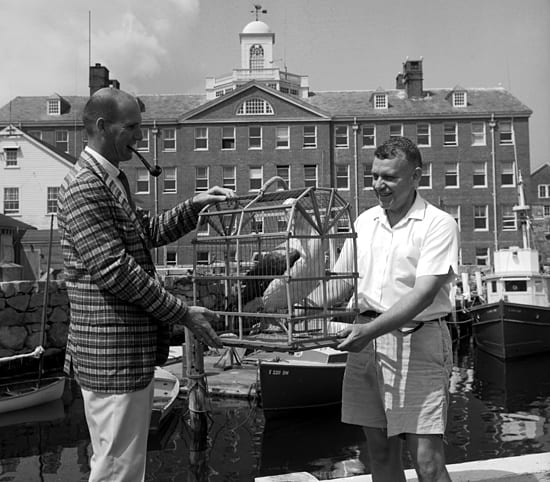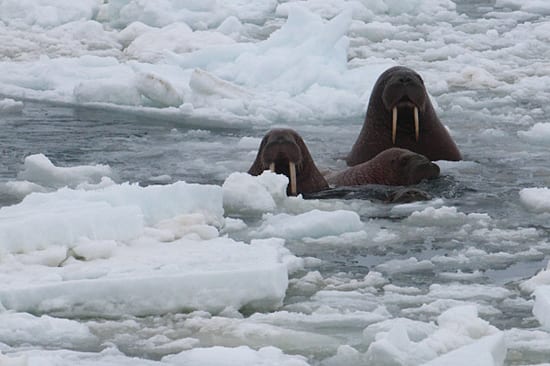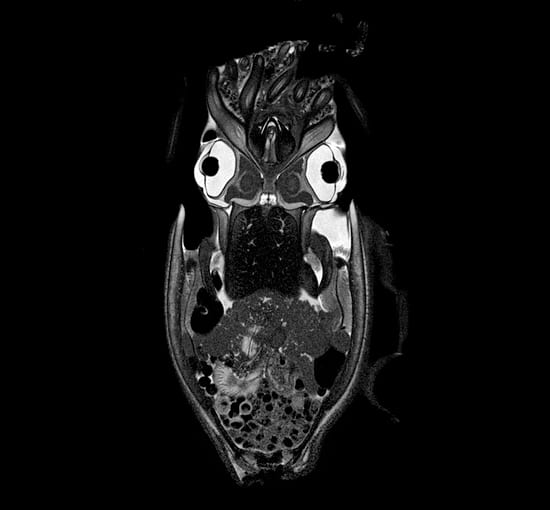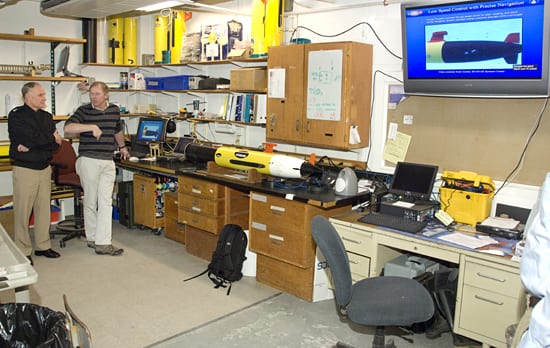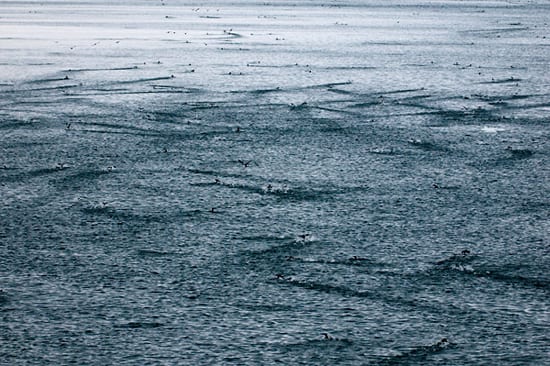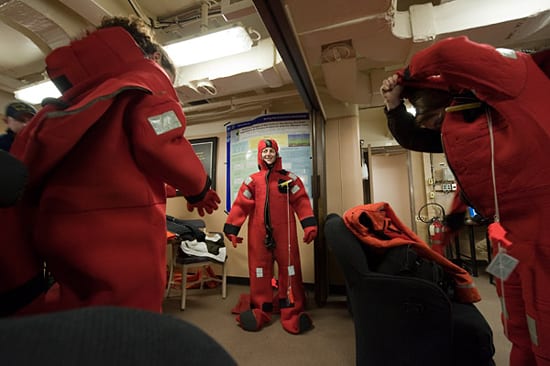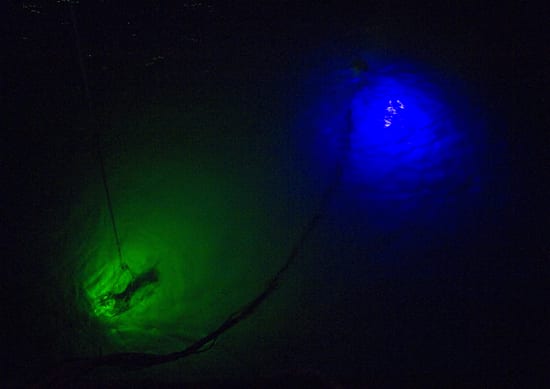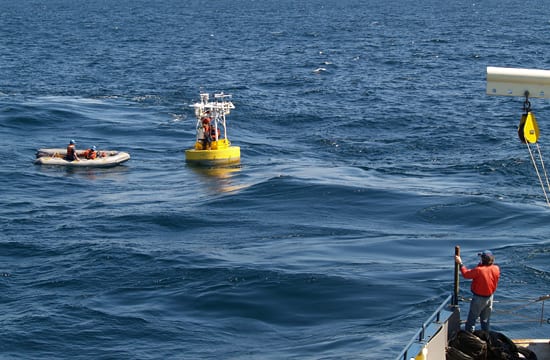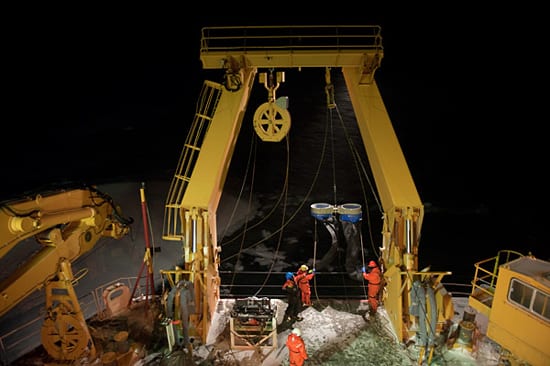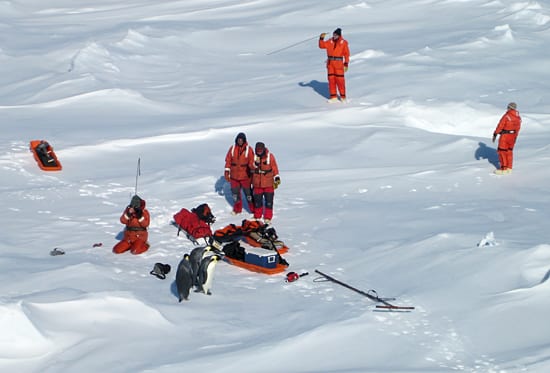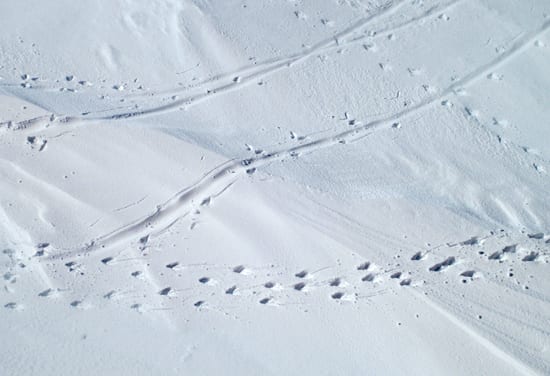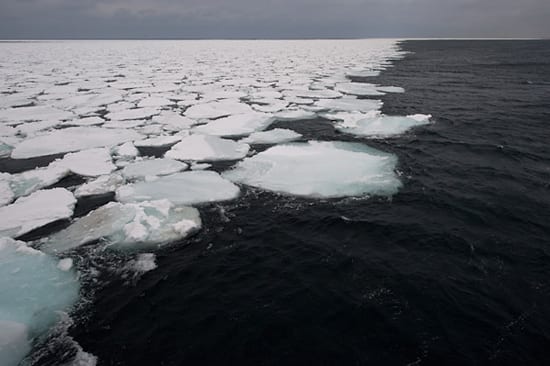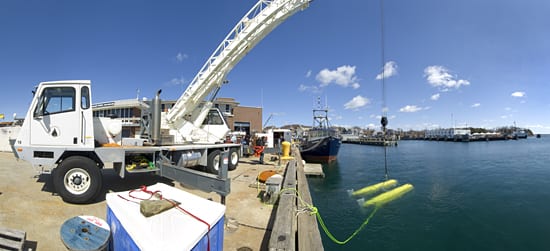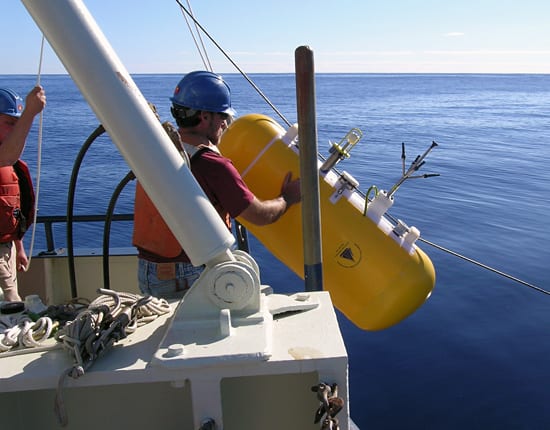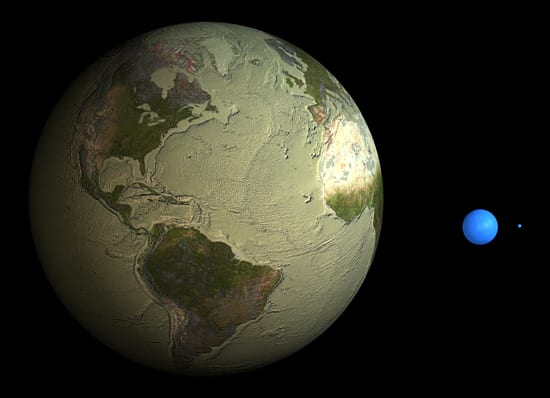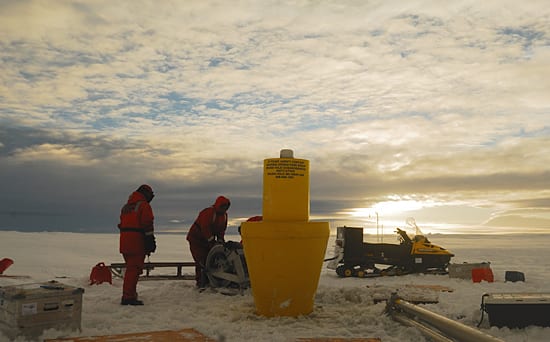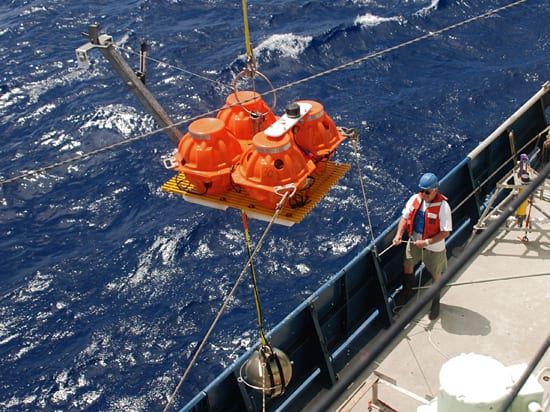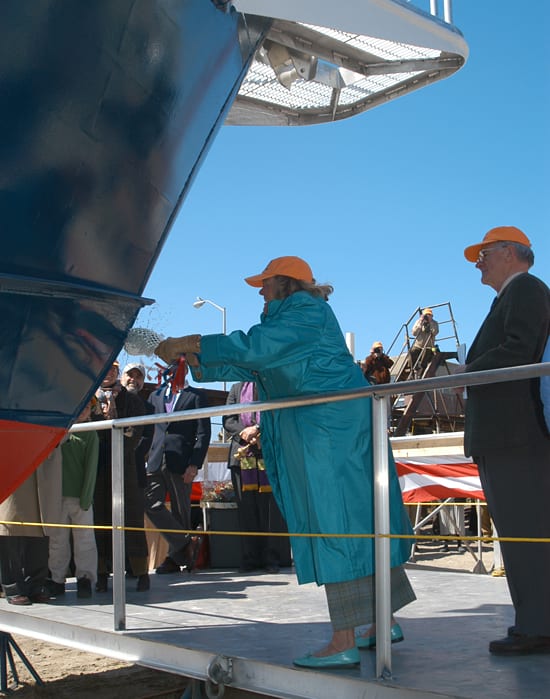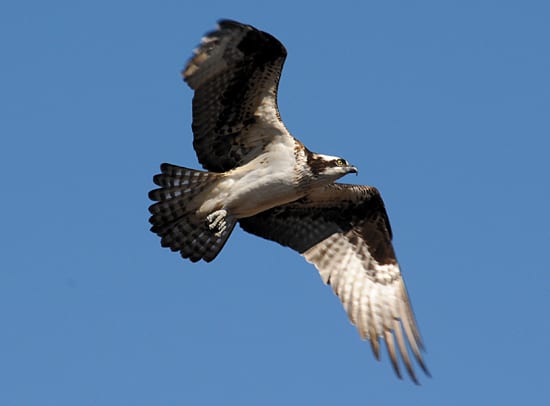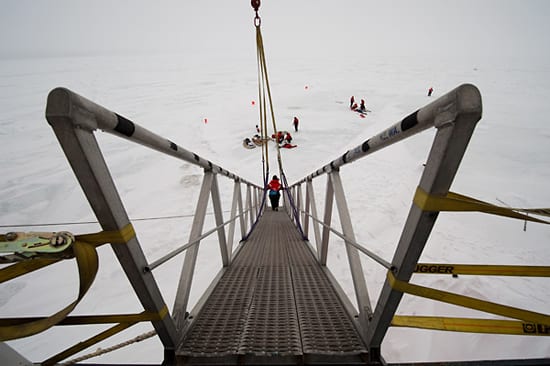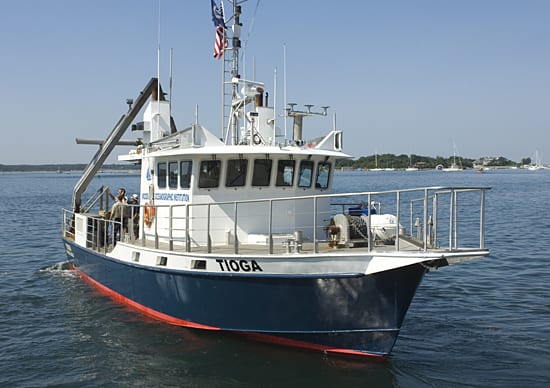Multimedia Items
In a day’s work
R/V Oceanus headed out from shore in fall 2007, little knowing what lay ahead. The cruise was to recover a buoy measuring waves and a mooring from the CLIMODE project,…
Read MoreKrill salad
Krill, beautiful krill….. a receding tide in Dutch Harbor, AK, left thousands of these shrimplike animals washed up on the beach, where WHOI researcher Phil Alatalo took this photo. He…
Read MoreWhy this caged bird won’t sing
WHOI scientists have garnered many medals and awards, but none is more fun than the Albatross Award, the stuffed bird in the cage held here by Henry Stommel, right, and…
Read MoreWalruses on the starboard side
A group of walruses pop out of the icy waters of the Bering Sea to investigate a large and curious newcomer to the neighborhood — the U.S. Coast Guard Cutter…
Read MoreCan you hear me?
Can a cuttlefish hear? A magnetic resonance image (MRI) reveals the internal anatomy of a cuttlefish (Sepia officinalis). WHOI postdoctoral scholar Aran Mooney, senior scientist Darlene Ketten, and scan technologist…
Read MoreShop talk
Navy Rear Admiral Nevin P. Carr (left) touring WHOI the REMUS lab recently with Ocean Systems Lab Principal Engineer Tom Austin. The autonomous vehicles are designed for coastal monitoring as…
Read MoreMurres for miles
Hundreds of thick-billed murres — medium-sized seabirds that resemble penguins — skitter in every direction along the icy waters of the Bering Sea as the U.S. Coast Guard Cutter Healy…
Read MoreWriter’s rite of passage
When on an icebreaker, you’d better dress for it! Science writer Helen Fields learned how to don an immersion suit, also called a “Gumby suit,” on the second day of…
Read MoreSignals in the dark
A difficult problem in oceanography is sending and receiving information and commands underwater. Generally, scientists send information to and from underwater instruments as signals through cables, or as sound that…
Read MoreHearing under the sea
WHOI postdoctoral scientist Aran Mooney, shown here in the WHOI Computerized Scanning and Imaging facility, studies marine animal hearing. He and colleagues recently investigated the effects of sonar sound on…
Read MoreSomeone to watch over me
Chief Scientist John Toole watches from the the R/V Oceanus as a team in a small boat sets out to perform repairs on a surface mooring in the Gulf Stream.…
Read MoreTake the A-Frame
Scientific instruments go into the water off the back of the ship, from an area called the fantail. Here, a pair of bongo nets— they look like a pair of…
Read MorePassing muster
A trio of Emperor penguins appear to inspect a sled full of equipment during an Antarctic expedition in January. The team of researchers, led by Stan Jacobs of Lamont Doherty…
Read MoreComing and going
The R/V Nathaniel B. Palmer pulled alongside an ice floe during a January-February 2009 Antarctic research cruise, so scientists aboard could take ice cores and samples. On the surface of…
Read MoreAhead of the pack
Twelve hours out of Dutch Harbor, Alaska, the scientists and crew aboard the Coast Guard Cutter, Healy, encountered the first patches of sea ice on their 40-day expedition. The research…
Read MoreDress rehearsal
A crane lifts WHOI’s newest vehicle, Nereus, off the dock and into the water for testing before it is sent to the “show” — the Challenger Deep in the Pacific’s…
Read MoreAn Ocean YoYo
A moored profiler is deployed from research vessel Oceanus in the western subtropical North Atlantic for climate change studies. Moored profilers take repeated measurements of ocean currents and water properties…
Read MoreHappy Earth (?) Day
Earth is an ocean planet. More than 70% of its surface is covered by ocean with an average depth of just over two miles. But how much water is there…
Read MoreAntarctic sojourner
After spending 12 hours on the ice, at a distance of more than 5 kilometers (3.1 miles) from their ship the R/V Nathaniel B. Palmer, engineers have installed the first…
Read MoreOrange aide
Engineering assistant Rob Handy handles a line during recovery of an ocean bottom seismometer (OBS) aboard R/V Atlantis in January 2009. The OBS was just one of 41 deployed along…
Read MoreToasting a new ship
Donor Hope Smith christens the R/V Tioga on March 29, 2004, as then-WHOI Director of Marine Operations Dick Pittenger looks on. The name Tioga comes from the Iroquois for “swift…
Read MoreAir fishing
The return of the famed osprey pair to the nest on the WHOI Quissett Campus is a sure sign that spring has almost sprung. Ospreys, which dine almost exclusively on…
Read MoreDown a slippery (and bouncy) slope
A multi-institutional team of researchers, led by WHOI biologist Carin Ashjian, are in the Arctic’s Bering Sea to study sea ice and how climate change could be affecting the region’s…
Read MoreThe little ship that could
Since its delivery to Woods Hole on April 16, 2004, the coastal research vessel Tioga, shown here approaching the WHOI dock, has been used to collect water samples during harmful…
Read More
